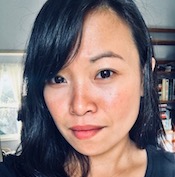ISSN: 1941-4137
POETRY THAT ENACTS THE ARTISTIC AND CREATIVE PURITY OF GLASS
POETRY THAT ENACTS THE ARTISTIC AND CREATIVE PURITY OF GLASS

Genevieve DeGuzman is a poet and writer of fiction. Her work has appeared in Connotation Press, Five:2:One, Folio, Gravel, Hobart, The Puritan, Reed Magazine, Rogue Agent, Strange Horizons, among others. She is a recipient of the 2019 James Merrill Poetry Fellowship, and was a finalist for the 2018 Sonia Sanchez-Langston Hughes Poetry Prize and a finalist for the 2017 Difficult Fruit Poetry Prize. Born in the Philippines, raised in California, and road-tested in 20+ countries, she now lives in Portland, Oregon.
Topsy
On rainy days you stay tethered
to my wrist. Sometimes I drag you. Sometimes
I let you float ahead of me. I grieved twice already:
once for you and once for our old life. But there will be
over-inflated balloons, more floating in the thermals
more floating in the hot air
exhaled by people in small rooms.
Grief is supposed to last a year, at least
the performance of it. Real grief, though, is not
pressed suits and hymnals but the choreography
of weeds taking over, the bulldozers filling up the pool,
sour breath condolences, the auctioneer praising
the production value of our wrecked decks and stained curtains
for some film student’s horror flick. I am left
with an archive to go through.
Coins, stamps, and clippings of stories.
I found one on Topsy the elephant
in your things, the first animal
sentenced to execution for crushing a man.
Wouldn’t it feel good, I wonder, to take a bow, to bear
down with the crown of my head, the anvil
of my foot?
Instead, I yell at the kids. I throw out the casseroles
left on my doorstep. I rip out the electrical wiring
in your office and imagine I’m tearing out my hair
in a pachyderm rage. When the hunters
dug traps and stole you from your mother,
how did you survive, Topsy? The traps
are everywhere now. Caravan troughs.
Electric prods in repose. Blood under nail-
beds. Lion
hunt. When your body was taken to the furnace
and returned in a box, I let your face behind my eyes
weather under the sun. I sat on Adirondack chairs that
our summers brittled to pieces. A seat sags and bows
like a back broken, and I think about how a plank of wood
needs to fit to make a decent door or violin
or widow’s spine.
People come in shifts to see how I’m holding up,
to see what jolts their tender admonishments can deliver.
But I turn them away. Electrocution stopped the heart, you see.
Brought down the tonnage of a life to its
downward dog. Breaking chains, snapping off
choke collars, so now I can say —
Topsy, we are free. We are free
to trumpet, we are free to trample all of it.
Topsy was a captive Asian elephant put to death in 1903, allegedly for crushing and killing a man (in the elephant’s defense, the guy threw a lit cigar in her mouth), though she was probably put down because she had proved too unruly for her handlers. The event was filmed in Luna Park on Coney Island. She was originally going to be hanged but that was deemed too cruel so they decided electrocution would be ‘more humane.’ It was a dramatic end to a life held in unthinkable cruelty and bondage. Yes, it’s an infuriating story, and when I first read about it, I knew I wanted to bring that into a poem somehow. On the surface, “Topsy” is a narrative told from the viewpoint of a woman who has lost someone close, someone she loves obviously. But love is complicated: love can be a burden, it can be its own bondage. The loss unlocks something other than grief. It unlocks a suppressed fury, but not a fury born out of anger; rather, one born out of a sense of bewildering freedom. Like being cut loose and left screaming in the wind. This poem is an attempt to express that catharsis when we become untethered by change.
Glass: A Journal of Poetry is published monthly by Glass Poetry Press.
All contents © the author.
All contents © the author.





